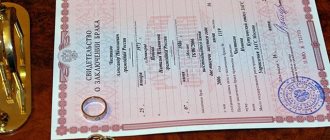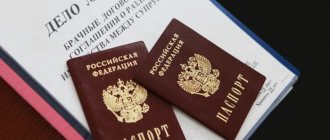Evidence provisions
The general provisions of procedural law impose an obligation on participants in the process to substantiate their statements.
In some cases, the burden of proof may be distributed differently. For example, in cases of causing harm, the plaintiff must prove the fact of causing harm, and the defendant must prove the absence of his fault. Indications for this are contained directly in the text of the law. In practice, you should not limit yourself to just proving your own position; if there is an opportunity to refute the arguments of the other side, you need to take advantage of it.
Art. 61 of the Code of Civil Procedure helps to avoid serious misunderstandings in judicial practice.
Article 69 of the Code of Civil Procedure of the Russian Federation. Witness's testimonies
A witness is a person who may know any information about circumstances relevant to the consideration and resolution of the case. Information provided by a witness is not evidence if he cannot indicate the source of his knowledge.
2. A person applying to call a witness must indicate what circumstances relevant to the consideration and resolution of the case can be confirmed by the witness, and inform the court of his name, patronymic, surname and place of residence.
3. The following are not subject to questioning as witnesses:
1) representatives in a civil or administrative case, or defense attorneys in a criminal case, a case of an administrative offense, or mediators - about the circumstances that became known to them in connection with the performance of the duties of a representative, defense attorney or mediator;
2) judges, jurors or arbitration assessors - about issues that arose in the deliberation room in connection with the discussion of the circumstances of the case when making a court decision or sentence;
3) clergy of religious organizations that have undergone state registration - about the circumstances that became known to them from confession.
4. The right to refuse to testify:
1) citizen against himself;
2) spouse against spouse, children, including adopted children, against parents, adoptive parents, parents, adoptive parents against children, including adopted children;
3) brothers, sisters against each other, grandfather, grandmother against grandchildren and grandchildren against grandfather, grandmother;
4) deputies of legislative bodies - in relation to information that became known to them in connection with the execution of deputy powers;
5) The Commissioner for Human Rights in the Russian Federation - in relation to information that has become known to him in connection with the performance of his duties;
6) Commissioner under the President of the Russian Federation for the protection of the rights of entrepreneurs, commissioners for the protection of the rights of entrepreneurs in the constituent entities of the Russian Federation - in relation to information that has become known to them in connection with the performance of their duties.
Grounds for exemption from proof
Two types of circumstances are not included in the subject of proof and, although they cannot be directly perceived by the participants in the process, they nevertheless do not require any action to substantiate reliability and can be used as the basis for a court decision in the case. These include: 1) facts recognized by the court as generally known, and 2) prejudicial (predetermined) facts established by a court decision that has entered into legal force in a previously considered case.
Well-known facts. Well-known fact is understood as awareness of it by an indefinite circle of people. In this case, the number of informed persons does not matter
It is important that these persons include a judge who accepts these facts without evidence. Hence, on the one hand, facts known to residents of a certain region (locality) can be considered generally known, but on the other hand, they are not necessarily known to all its residents.
Thus, the first sign of this kind of fact presupposes the availability and prevalence of information that claims to be generally known, including the possession of it by the judge. The second sign is the recognition of such information as generally known by the court, which exempts the person from proving it.
Prejudicial facts
.
Prejudiciality is the obligatory nature of conclusions about the facts established by a court decision that has entered into legal force for all other judicial bodies and other organizations when establishing these facts. Hence, circumstances established by a court decision that has entered into legal force in a previously considered case are called prejudicial. They are mandatory for the court (Part 2 of Article 61 of the Code of Civil Procedure of the Russian Federation). When such facts fall within the scope of judicial proceedings in a civil case, their secondary proof is not carried out and they are accepted as established, true provisions. Prejudicial facts, unlike generally known ones, do not need to be recognized by the court and not only do not need to be proven. They are prohibited from being challenged when considering another case. However, the prejudicial force of such circumstances extends only to the same persons who participated in the case in which these facts were established. USEFUL INFORMATION: Receipt for receipt of funds for refusal of inheritance sample
Not only decisions of courts of general jurisdiction in civil cases, but also decisions of an arbitration court, a verdict in a criminal case and decisions of a judge in a case of an administrative offense have the property of prejudice.
When considering a civil case, the circumstances established by a decision of the arbitration court that has entered into legal force must not be proven and cannot be disputed by persons if they participated in the case that was resolved by the arbitration court (Part 3 of Article 61 of the Code of Civil Procedure).
The situation is somewhat different with the verdict of a court of general jurisdiction in a criminal case. A court verdict in a criminal case that has entered into legal force is obligatory for the court considering the case on the civil consequences of the actions of the person in respect of whom the court verdict was passed, on the issues of whether these actions took place and whether they were committed by this person (Part 4 of Art. 61 Code of Civil Procedure).
Indisputable facts
. It is necessary to distinguish indisputable facts from generally known and prejudicial facts. In civil proceedings, these include facts recognized (not disputed) by the parties to the case. In accordance with the adversarial principle, the indisputability of a fact obliges the court to recognize it as existing without further proof.
In the civil procedural legislation of the Russian Federation, such facts are not directly mentioned. Moreover, the parties’ silence about any circumstance does not classify it as such facts, since the court may impose the obligation to prove it on its own initiative (Part 2 of Article 56 of the Code of Civil Procedure). However, the Code of Civil Procedure refers to facts admitted by the other party to the case. This recognition must be properly procedurally formalized (Part 2 of Article 68 of the Code of Civil Procedure). Only in this case, the party who indicated these circumstances to the court is exempt from the need to further prove them
At the same time, the court may not take into account the confession made by a party to the case if obstacles to this are found specified in the law (Part 3 of Art.
USEFUL INFORMATION: Maternity capital is divided during divorce
68 Code of Civil Procedure). Thus, in civil proceedings there are no indisputable facts, there are only recognized (undisputed) facts. The party is released from further proof of such facts by virtue of the confession accepted by the court.
Civil Procedure Code of the Code of Civil Procedure of the Russian Federation
Chapter 15. Trial
Article 154. Time limits for consideration and resolution of civil cases
1. Civil cases are considered and resolved by the court before the expiration of two months from the date of receipt of the application to the court, unless other terms for consideration and resolution of cases are established by this Code, and by the magistrate before the expiration of a month from the date of acceptance of the application for proceedings.
(as amended by Federal Law dated June 28, 2009 N 128-FZ)
2. Cases regarding reinstatement at work and collection of alimony are considered and resolved before the end of the month.
3. Federal laws may establish shortened deadlines for consideration and resolution of certain categories of civil cases.
Article 155. Court hearing
The hearing of a civil case takes place in a court session with mandatory notification of the persons participating in the case about the time and place of the hearing.
Article 156. Presiding judge at a court hearing
1. A judge considering a case alone performs the duties of the presiding judge. During a collegial hearing of a case in a district court, the judge or chairman of this court presides; in sessions of other courts, the judge, chairman or deputy chairman of the relevant court presides.
2. The presiding judge presides over the court hearing, creates conditions for a comprehensive and complete examination of the evidence and circumstances of the case, and eliminates from the trial everything that is not related to the case under consideration. If any of the participants in the process objects to the actions of the presiding officer, these objections are recorded in the minutes of the court session. The presiding officer gives explanations regarding his actions, and during a collegial consideration of the case, explanations are given by the entire composition of the court.
3. The presiding officer takes the necessary measures to ensure proper order at the court hearing. The orders of the presiding judge are binding on all participants in the process, as well as on citizens present in the courtroom.
Article 157. Immediacy, orality and continuity of judicial proceedings
1. When considering a case, the court is obliged to directly examine the evidence in the case: listen to explanations of the parties and third parties, testimony of witnesses, expert opinions, consultations and explanations of specialists, read written evidence, examine material evidence, listen to audio recordings and watch video recordings.
2. The hearing of the case takes place orally and with the same composition of judges. If one of the judges is replaced during the consideration of a case, the proceedings must be carried out from the very beginning.
3. The court hearing in each case takes place continuously, with the exception of the time appointed for rest. Until the end of the consideration of the initiated case or until the adjournment of its proceedings, the court has no right to consider other civil, criminal and administrative cases.
Article 158. Procedure at a court hearing
1. When judges enter the courtroom, everyone present in the courtroom stands up. The announcement of the court decision, as well as the announcement of the court ruling, which ends the case without making a decision, is heard by all those present in the courtroom standing.
2. Participants in the trial address the judges with the words: “Dear Court!”, and they give their testimony and explanations while standing. Deviations from this rule may be permitted with the permission of the presiding officer.
3. The trial takes place in conditions that ensure proper order in the court hearing and the safety of the participants in the process.
4. The proper order in a court hearing should not be interfered with by the actions of citizens present in the courtroom and taking photographs and video recordings permitted by the court, and broadcasting the court hearing on radio and television. These actions must be carried out at places in the courtroom indicated by the court and, taking into account the opinions of the persons participating in the case, may be limited by the court in time.
5. Participants in the process and all citizens present in the courtroom are obliged to comply with the established order in the court session.
Article 159. Measures applied to violators of order at a court hearing
1. A person who violates order at a court hearing is given a warning by the presiding judge on behalf of the court.
2. In case of repeated violation of order, a person participating in the case or his representative may be removed from the courtroom on the basis of a court ruling for the entire duration of the court session or part of it. In the latter case, the presiding officer introduces the person newly admitted to the courtroom with the procedural actions performed in his absence. Citizens present at the court hearing for repeated violation of order are removed by order of the presiding officer from the courtroom for the entire duration of the court session.
3. The court also has the right to impose a fine of up to one thousand rubles on persons guilty of violating order at a court hearing.
(as amended by Federal Law dated June 11, 2008 N 85-FZ)
4. If the actions of a person violating order in a court session contain signs of a crime, the judge sends the relevant materials to the inquiry or preliminary investigation authorities to initiate criminal proceedings against the violator.
(as amended by Federal Law dated July 24, 2007 N 214-FZ)
5. In the event of a massive violation of order by citizens present at a court hearing, the court may remove citizens who are not participants in the process from the courtroom and consider the case in a closed court session or postpone the hearing of the case.
Article 160. Opening of a court session
At the time appointed for the hearing of the case, the presiding judge opens the court session and announces which civil case is to be considered.
Article 161. Checking the attendance of participants in the process
1. The secretary of the court session reports to the court which of the persons summoned in the civil case appeared, whether the persons who did not appear were notified and what information is available about the reasons for their absence.
2. The presiding officer establishes the identity of the participants in the process, checks the powers of officials and their representatives.
Article 162. Explanation to the translator of his rights and obligations
1. Persons participating in the case have the right to nominate a translator to the court.
2. The presiding officer explains to the translator his obligation to translate explanations, testimonies, statements of persons who do not speak the language in which the proceedings are conducted, and for persons who do not speak the language in which the proceedings are conducted, the content of the explanations, testimonies, statements of persons participating in the case available in the case , witnesses and read documents, audio recordings, expert opinions, consultations and explanations of specialists, orders of the presiding officer, rulings or court decisions.
3. The translator has the right to ask the participants in the process present during the translation questions to clarify the translation, get acquainted with the minutes of the court session or a separate procedural action and make comments regarding the correctness of the translation, which are subject to entry into the minutes of the court session.
4. The presiding officer warns the translator about the responsibility provided for by the Criminal Code of the Russian Federation for knowingly incorrect translation and attaches his signature to this effect to the minutes of the court session.
If a translator fails to appear in court or to properly perform his duties, he may be subject to a fine of up to one thousand rubles.
(as amended by Federal Law dated June 11, 2008 N 85-FZ)
5. The rules of this article apply to a person who has sign language translation skills.
Article 163. Removal of witnesses from the courtroom
Witnesses who have appeared are removed from the courtroom. The presiding officer takes measures to ensure that interrogated witnesses do not communicate with unexamined witnesses.
Article 164. Announcement of the composition of the court and clarification of the right of self-recusal and challenge
1. The presiding officer announces the composition of the court, informs who is participating in the court session as a prosecutor, the secretary of the court session, representatives of the parties and third parties, as well as as an expert, specialist, translator, and explains to the persons participating in the case their right to recuse themselves and bends.
2. The grounds for self-challenges and challenges, the procedure for their resolution and the consequences of satisfying applications for self-challenges and challenges are determined by Articles 16 - 21 of this Code.
Article 165. Explanation to persons participating in the case of their procedural rights and obligations
The presiding officer explains to the persons participating in the case their procedural rights and obligations, and to the parties also their rights provided for in Article 39 of this Code.
Article 166. Resolution by the court of petitions of persons participating in the case
Petitions from persons participating in the case on issues related to the proceedings of the case are resolved on the basis of court rulings after hearing the opinions of other persons participating in the case.
Article 167. Consequences of failure to appear at a court hearing by persons participating in the case and their representatives
1. Persons participating in the case are obliged to notify the court of the reasons for failure to appear and provide evidence of the validity of these reasons.
2. If any of the persons participating in the case, in respect of whom there is no information about their notification, fails to appear at the court hearing, the hearing of the case is postponed.
If the persons participating in the case are notified of the time and place of the court hearing, the court postpones the hearing of the case if the reasons for their failure to appear are recognized as valid.
3. The court has the right to consider the case if any of the persons participating in the case and notified of the time and place of the court session fail to appear, if they do not provide information about the reasons for the failure to appear or the court recognizes the reasons for their failure to appear as disrespectful.
If a citizen in respect of whom an application for declaring him incompetent has been filed is duly notified of the time and place of the trial, consideration of the case in his absence is allowed provided that the court recognizes the reasons for his failure to appear as disrespectful.
(paragraph introduced by Federal Law dated 04/06/2011 N 67-FZ)
4. The court has the right to consider the case in the absence of the defendant, who has been notified of the time and place of the court hearing, if he has not informed the court of valid reasons for failure to appear and has not asked to consider the case in his absence.
5. The parties have the right to ask the court to consider the case in their absence and to send them copies of the court decision.
6. The court may postpone the hearing of a case at the request of a person participating in the case due to the failure of his representative to appear for a valid reason.
Article 168. Consequences of failure of witnesses, experts, specialists, interpreters to appear at a court hearing
1. If witnesses, experts, specialists, and translators fail to appear at the court hearing, the court shall listen to the opinion of the persons participating in the case about the possibility of considering the case in the absence of witnesses, experts, specialists, and translators, and make a decision to continue the trial or to postpone it.
2. If a summoned witness, expert, specialist, or translator does not appear at the court hearing for reasons recognized by the court as disrespectful, he may be subject to a fine of up to one thousand rubles. If a witness fails to appear at a court hearing without good reason due to a second summons, he or she may be subject to forced attendance.
(as amended by Federal Law dated June 11, 2008 N 85-FZ)
Article 169. Postponement of the hearing of the case
1. Postponement of the trial of a case is allowed in cases provided for by this Code, as well as in the event that the court finds it impossible to consider the case in this court session due to the failure of any of the participants in the process to appear, the filing of a counterclaim, the need to present or require additional evidence, or the involvement of participation in the case of other persons, performing other procedural actions. The court may postpone the hearing of the case for a period not exceeding sixty days at the request of both parties if they decide to conduct a mediation procedure.
(as amended by Federal Law dated July 27, 2010 N 194-FZ)
2. If the trial of the case is postponed, a date for a new court hearing is set, taking into account the time required to call the participants in the process or to request evidence, which is announced to the persons who appear against a signature. Persons who failed to appear and persons newly invited to participate in the process are notified of the time and place of the new court hearing.
3. The trial of the case after its adjournment begins again.
4. If the parties do not insist on repeating the explanations of all participants in the process, are familiar with the case materials, including the explanations of the participants in the process given earlier, the composition of the court has not changed, the court has the right to provide the participants in the process with the opportunity to confirm previously given explanations without repeating them , supplement them, ask additional questions.
Article 170. Interrogation of witnesses when adjourning the trial of a case
If the trial of a case is postponed, the court has the right to question the witnesses who have appeared, if the parties are present at the court hearing. The second summoning of these witnesses to a new court hearing is allowed only if necessary.
Article 171. Explanation to the expert and specialist of their rights and obligations
The presiding officer explains to the expert and specialist their rights and obligations, and also warns the expert about criminal liability for giving a knowingly false conclusion, about which he is required to sign, which is attached to the minutes of the court session.
Article 172. Beginning of consideration of the case on the merits
The consideration of the case on its merits begins with a report by the presiding judge or one of the judges. The presiding officer then determines whether the plaintiff supports his claims, whether the defendant accepts the plaintiff’s demands, and whether the parties wish to conclude the case with a settlement agreement or conduct a mediation procedure.
(as amended by Federal Law dated July 27, 2010 N 194-FZ)
Article 173. Refusal of the claim by the plaintiff, recognition of the claim by the defendant and settlement agreement between the parties
1. The plaintiff’s statement of abandonment of the claim, the recognition of the claim by the defendant and the terms of the settlement agreement between the parties are entered into the minutes of the court session and signed by the plaintiff, the defendant or both parties. If the refusal of the claim, recognition of the claim or a settlement agreement of the parties is expressed in written statements addressed to the court, these statements are attached to the case, as indicated in the minutes of the court session.
2. The court explains to the plaintiff, defendant or parties the consequences of abandoning the claim, recognizing the claim or concluding a settlement agreement between the parties.
3. If the plaintiff abandons the claim and accepts it by the court or approves a settlement agreement between the parties, the court issues a ruling, which simultaneously terminates the proceedings. The court's ruling must indicate the terms of the settlement agreement between the parties approved by the court. If the defendant recognizes the claim and accepts it, the court makes a decision to satisfy the claims made by the plaintiff.
4. If the court does not accept the plaintiff’s refusal of the claim, the defendant recognizes the claim, or does not approve the amicable agreement of the parties, the court makes a ruling on this and continues to consider the case on the merits.
Article 174. Explanations of persons participating in the case
1. After the report of the case, the court hears the explanations of the plaintiff and a third party participating on his side, the defendant and a third party participating on his side, and then other persons participating in the case. The prosecutor, representatives of state bodies, local government bodies, organizations, citizens who have applied to the court for the protection of the rights and legitimate interests of other persons are the first to give explanations. Persons participating in the case have the right to ask each other questions. Judges have the right to ask questions to persons participating in the case at any time during their explanations.
2. Explanations in writing of persons participating in the case, in case of their failure to appear, as well as in cases provided for in Articles 62 and 64 of this Code, are announced by the presiding officer.
Article 175. Establishing the sequence of examination of evidence
The court, having heard the explanations of the persons participating in the case and taking into account their opinions, establishes the sequence of examination of the evidence.
Article 176. Warning a witness about liability for refusal to testify and for giving knowingly false testimony
1. Before questioning a witness, the presiding judge establishes his identity, explains to him the rights and obligations of the witness and warns him of criminal liability for refusal to testify and for giving knowingly false testimony. The witness is required to sign that his duties and responsibilities have been explained to him. The subscription is attached to the minutes of the court session.
2. To a witness under the age of sixteen, the presiding officer explains the obligation to truthfully tell everything known to him about the case, but he is not warned about liability for unlawful refusal to testify and for giving knowingly false testimony.
Article 177. Procedure for questioning a witness
1. Each witness is questioned separately.
2. The presiding judge ascertains the attitude of the witness to the persons participating in the case and invites the witness to tell the court everything that he personally knows about the circumstances of the case.
3. After this, the witness may be asked questions. The first to ask questions is the person at whose request the witness was called, the representative of this person, and then the other persons participating in the case, their representatives. Judges have the right to ask questions of a witness at any time during his interrogation.
4. If necessary, the court may re-examine the witness at the same or the next court hearing, as well as re-interrogate witnesses to clarify contradictions in their testimony.
5. The interrogated witness remains in the courtroom until the end of the trial, unless the court allows him to leave earlier.
Article 178. Use of written materials by a witness
When giving testimony, a witness may use written materials in cases where the testimony involves any digital or other data that is difficult to retain in memory. These materials are presented to the court, to the persons participating in the case, and can be added to the case on the basis of a court ruling.
Article 179. Interrogation of a minor witness
1. The interrogation of a witness under the age of fourteen, and at the discretion of the court, the interrogation of a witness between the ages of fourteen and sixteen years, is carried out with the participation of a teaching worker who is summoned to court. If necessary, the parents, adoptive parents, guardian or trustee of the minor witness are also called. These persons may, with the permission of the presiding officer, ask the witness questions, as well as express their opinion regarding the identity of the witness and the content of the testimony given by him.
2. In exceptional cases, if it is necessary to establish the circumstances of the case, during the interrogation of a minor witness, one or another person participating in the case may be removed from the courtroom on the basis of a court ruling, or any of the citizens present may be removed in the courtroom. The person participating in the case, after returning to the courtroom, must be informed of the content of the testimony of the minor witness and must be given the opportunity to ask the witness questions.
3. A witness who has not reached the age of sixteen is removed from the courtroom at the end of his interrogation, unless the court finds it necessary for the presence of this witness in the courtroom.
Article 180. Announcement of testimony of witnesses
Testimony of witnesses obtained in cases provided for in Articles 62, 64, part one of Article 70 and Article 170 of this Code is read out at the court hearing, after which the persons participating in the case have the right to give explanations on them.
Article 181. Study of written evidence
Written evidence or protocols of their inspection, drawn up in cases provided for in Articles 62, 64, paragraph 10 of part one of Article 150 of this Code, are read out at the court hearing and presented to the persons participating in the case, their representatives, and, if necessary, witnesses, experts, specialists . After this, the persons involved in the case can give explanations.
Article 182. Publication and examination of correspondence and telegraph messages of citizens
In order to protect the secrecy of correspondence and telegraph messages, correspondence and telegraph messages of citizens can be read out and examined by the court in an open court session only with the consent of the persons between whom these correspondence and telegraph messages occurred. Without the consent of these persons, their correspondence and telegraph messages are read out and examined in a closed court session.
Article 183. Study of material evidence
1. Physical evidence is examined by the court and presented to the persons participating in the case, their representatives, and, if necessary, witnesses, experts, and specialists. Persons who are presented with material evidence may draw the court’s attention to certain circumstances related to the inspection. These statements are recorded in the minutes of the court hearing.
2. Protocols of the on-site examination of material evidence are announced at the court hearing, after which the persons participating in the case can give explanations.
Article 184. On-site inspection
1. Written and material evidence that is impossible or difficult to deliver to the court is inspected and examined at its location or in another place determined by the court. The court issues a ruling on the on-site inspection.
2. The persons participating in the case and their representatives are notified of the time and place of the inspection, but their failure to appear does not prevent the inspection. If necessary, witnesses, experts, and specialists are also called.
3. The results of the on-site inspection are entered into the minutes of the court session. Attached to the protocol are plans, diagrams, drawings, calculations drawn up or verified during the inspection, copies of documents made during the inspection of video recordings, photographs of written and material evidence, as well as an expert’s opinion and specialist consultation in writing.
Article 185. Reproduction of audio or video recordings and its examination
1. When playing an audio or video recording containing personal information, as well as when examining it, the rules provided for in Article 182 of this Code are applied.
2. Reproduction of an audio or video recording is carried out in a courtroom or other room specially equipped for this purpose, indicating in the minutes of the court session the signs of the reproducing sources of evidence and the time of reproduction. After this, the court hears explanations from the persons involved in the case. If necessary, playback of the audio or video recording can be repeated in full or in any part.
3. In order to clarify the information contained in the audio or video recording, the court may involve a specialist. If necessary, the court may order an examination.
Article 186. Statement of falsification of evidence
If there is a statement that the evidence in the case is fraudulent, the court may order an examination to verify this statement or invite the parties to present other evidence.
Article 187. Study of an expert's opinion. Appointment of additional or repeated examination
1. The expert’s opinion is announced at the court hearing. In order to clarify and supplement the conclusion, questions may be asked to the expert. The first to ask questions is the person at whose request the examination was appointed, his representative, and then the other persons participating in the case and their representatives ask questions. If the examination is appointed on the initiative of the court, the plaintiff and his representative are the first to ask questions of the expert. Judges have the right to ask questions to the expert at any time during his interrogation.
2. The expert’s conclusion is examined at the court hearing, assessed by the court along with other evidence and does not have pre-established force for the court. The court's disagreement with the expert's conclusion must be motivated in the court's decision on the case or in the court's ruling on ordering an additional or repeat examination, carried out in cases and in the manner provided for in Article 87 of this Code.
Article 188. Consultation with a specialist
1. In necessary cases, when examining written or material evidence, playing audio or video recordings, ordering an examination, questioning witnesses, taking measures to secure evidence, the court may involve specialists to receive advice, explanations and provide direct technical assistance (photography, drawing up plans and diagrams , selection of samples for examination, property assessment).
2. A person summoned as a specialist is obliged to appear in court, answer questions posed by the court, give oral or written advice and explanations, and, if necessary, provide technical assistance to the court.
3. The specialist gives the court advice orally or in writing, based on professional knowledge, without conducting special studies prescribed on the basis of a court ruling.
A specialist's consultation, given in writing, is announced at the court hearing and attached to the case. Consultations and explanations of a specialist, given orally, are recorded in the minutes of the court session.
4. In order to clarify and supplement the consultation, questions may be asked to the specialist. The person at whose request the specialist was involved, the representative of this person, asks questions first, and then other persons participating in the case and their representatives ask questions. The specialist brought in at the initiative of the court is the first to be asked questions by the plaintiff and his representative. Judges have the right to ask questions to a specialist at any time during his interrogation.
Article 189. Completion of consideration of the case on the merits
After examining all the evidence, the presiding officer gives the floor for an opinion on the case to the prosecutor, a representative of a state body or a representative of a local government body participating in the process in accordance with part three of Article 45 and Article 47 of this Code, and finds out from other persons participating in the case their representatives whether they would like to provide further explanations. In the absence of such statements, the presiding judge declares the consideration of the case on the merits completed and the court proceeds to judicial debate.
Article 190. Judicial debates
1. Judicial debates consist of speeches by persons participating in the case and their representatives. In judicial debates, the plaintiff, his representative, speaks first, then the defendant, his representative.
2. The third party, who has declared an independent claim regarding the subject of the dispute in the initiated process, and his representative in the judicial debate speak after the parties and their representatives. The third party, who has not made independent claims regarding the subject of the dispute, and his representative in the judicial debate speak after the plaintiff or defendant, on the side of one of whom the third party participates in the case.
3. The prosecutor, representatives of state bodies, local government bodies, organizations and citizens who have applied to the court for the protection of the rights and legitimate interests of other persons speak first in the judicial debate.
4. After speeches have been made by all persons participating in the case and their representatives, they can make remarks in connection with what has been said. The right of the last remark always belongs to the defendant, his representative.
Article 191. Resumption of consideration of the case on the merits
1. Persons participating in the case, their representatives, in their speeches after the end of the consideration of the case on the merits, do not have the right to refer to circumstances that were not clarified by the court, as well as to evidence that was not examined at the court hearing.
2. If the court, during or after the judicial debate, finds it necessary to find out new circumstances relevant to the consideration of the case, or to examine new evidence, it issues a ruling to resume consideration of the case on the merits. After the consideration of the case on its merits, judicial debates take place in the general manner.
Article 192. Removal of the court to make a decision
After the judicial debate, the court retires to the deliberation room to make a decision, which the presiding officer announces to those present in the courtroom.
Article 193. Announcement of a court decision
1. After the decision is made and signed, the court returns to the courtroom, where the presiding judge or one of the judges announces the court decision. Then the presiding officer orally explains the content of the court decision, the procedure and deadline for appealing it.
2. When announcing only the operative part of a court decision, the presiding judge is obliged to explain when the persons participating in the case and their representatives can familiarize themselves with the reasoned court decision.
Judicial acts in a civil case
The Code of Civil Procedure makes reference to court decisions. This includes rulings and decisions of courts of first and second instance, rulings of cassation and supervisory courts. After all, paragraph 2 of Art. 61 of the Code of Civil Procedure of the Russian Federation refers to all judicial acts that end the trial. For example, a ruling on refusal to open proceedings.
Judicial acts are significant if they were adopted during the consideration of a dispute between the same parties (plaintiffs, defendants, third parties, interested parties).
It should be noted that when replacing a person participating as a party to the process, the provisions on legal succession apply.
Article 69 of the Code of Civil Procedure of the Russian Federation. Testimony (current version)
74; 2003. N 27. Art. 2700.
**NW RF. 1997. N 9. Art. 1011.
Consultations and comments from lawyers on Article 69 of the Code of Civil Procedure of the Russian Federation
If you still have questions regarding Article 69 of the Code of Civil Procedure of the Russian Federation and you want to be sure of the relevance of the information provided, you can consult the lawyers of our website.
possible by phone or on the website. Initial consultations are held free of charge from 9:00 to 21:00 daily Moscow time. Questions received between 21:00 and 9:00 will be processed the next day.








